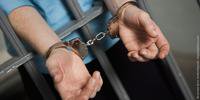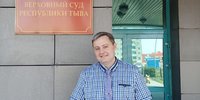The Case of Senin in Kyzyl
Filter
- #
- #
The court softens the measure of restraint for Anatoliy Senin and Vitaliy Manzyrykchi to recognizance not to leave.
- #
The criminal case against Vitaliy Manzyrykchi was terminated without the right to rehabilitation.
- #
Olchi Okhemchik, an investigator for particularly important cases of the Investigative Directorate of the Investigative Committee of the Russian Federation for the Republic of Tuva, is prosecuting Anatoly Senin as a defendant under Part 1 of Article 282.2 of the Criminal Code of the Russian Federation. According to the investigation, in July 2019, the believer, "realizing his criminal intent," organized the activities of Jehovah's Witnesses in Kyzyl: he broadcast religious videos, encouraged the audience to pray, sing religious songs and study the Bible.
- #
The case against Anatoly Senin is submitted to the Kyzyl City Court of the Republic of Tuva.
- #
The prosecutor reads out the indictment. The defendant speaks with an attitude to the charge. The judge interrupts Anatoly Senin and asks him not to quote the Bible, but to say his attitude to the case in general terms. The defendant tactfully explains that since he is a believer, the law of God is important to him, and it is he who helps him to be a law-abiding citizen. At the end of the speech, the court attaches its text to the case file.
The lawyer supports the position of the defendant and expresses confidence that Senin has nothing to do with legal entities whose activities were banned. He emphasizes that joint discussions of biblical texts and worship are not prohibited by current legislation.
- #
The prosecutor reads out the evidence from the indictment, for example, a list of what was seized during the search, where and how the seizure took place. The lawyer asks the prosecutor to voice the charges in detail. To this, the judge says that Article 285 of the Code of Criminal Procedure of the Russian Federation allows the essence of the accusation to be announced in part.
- #
The court interrogates the owner of the housing that Senin rented. She describes Anatoliy and his wife as peace-loving citizens: "Payment was always brought on time, even it was early. And he and his wife have a very peaceful and strong relationship. Animals are loved." She did not hear any calls for disrespect for authority or hate speech from the spouses.
Another prosecution witness is Ulyana Bicheldey, head of the religious studies sector of the Tuva Institute for Humanitarian Studies under the Government of the Republic of Tuva. It reveals general information about world religions and their differences. He reports that she has not yet studied the religion of Jehovah's Witnesses, so she cannot say anything about it, but sees the defendant for the first time.
The court proceeds to the interrogation of FSB operative Vladimir Vasiliev. He does not know the defendant personally, but he knows him as part of his official activities, as he carried out operational-search measures against believers. The witness refers to the decision of the Supreme Court of 2017, which, according to Vasiliev, "banned the activities of Jehovah's Witnesses," but to delve into the essence of this decision, in his words, "is not part of his duties."
The next witness, a colleague of Senin's wife, says she has never heard from the defendant extremist, divisive statements, propaganda of exclusivity, inducements to refuse medical care or obscene language. The prosecutor reads out part of the preliminary testimony of the witness, where she said that she heard how Senin's wife communicated with her husband via video link and suggested that these conversations were worship services. In court, the woman claims that this was only one of the assumptions that the investigator insisted on during the interrogation. It could be an ordinary conversation between husband and wife.
The prosecutor asks for the testimony of a minor witness to be read out. Despite the objections of the lawyer, the court allows.
- #
Familiarization with the case materials continues. Protocols of inspections of things seized from Vitaliy Manzyrykchi, Alexander Kazakov and others were provided. At the request of the defense to give them more time to prepare, the judge refuses, explaining his reluctance to delay the process in the interests of the court and the defendant.
- #
The employer Anatoly Senin is being interrogated. She characterizes him as a calm, kind, sociable, responsible worker, honest and decent person.
At the request of the lawyer, the court attaches the characteristics of the defendant at the place of residence, from work, a certificate stating that he is not registered in narcological and psychiatric dispensaries, as well as a certificate stating that during the period of house arrest Senin did not commit violations and appeared to the investigator in a timely manner.
- #
The court reviews the video recording of the liturgical meeting at the request of the lawyer. He draws the judge's attention to the fact that the recordings do not discuss publications from the list of extremist materials.
- #
The video continues to be watched. The lawyer emphasizes that the worship service is about preserving family values, and this has nothing to do with extremism.
The court allows Anatoly Senin to travel outside the city to visit his elderly mother.
- #
The defense announces the materials of the case (volumes 8-10) and briefly explains them.
The lawyer draws attention to an extract from the program for the preparation of religious students. It states that discussions about the truth or worth of any religion have nothing to do with the science of religion and belong exclusively to the field of theology and philosophy. That is, they are only evaluative in nature, and when people call their faith true, this should not be considered a crime.
As arguments, he also cites the decision of the European Court of Human Rights (ECHR) in the case of Kuznetsov and Others v. Russia from 2007. It assesses judicial practice on the territory of the Russian Federation and concludes that holding joint worship services and studying the Bible are not a violation of the law, but the exercise of the right to freedom of religion.
In addition, the lawyer reads excerpts from a forensic comprehensive psychological and linguistic religious examination made in the Kemerovo region in 2013. It concludes that not all publications of Jehovah's Witnesses are included in the list of extremist materials, but only some. This document also emphasizes that statements about the truth of their doctrine are characteristic of adherents of all religions and do not indicate extremism.
- #
A witness for the prosecution, a young man under the pseudonym Maria, who previously attended services of Jehovah's Witnesses, is being questioned. He says that he has never heard calls for extremist actions from Anatoly Senin. The witness finds it difficult to answer most of the questions, he speaks confusedly and is confused in his testimony.
- #
The lawyer continues to read out the documents provided by the defense. Among them is the conclusion regarding Jehovah's Witnesses, which was made by Mikhail Odintsov, Doctor of Historical Sciences, religious historian and former employee of the Office of the Commissioner for Human Rights in the Russian Federation. According to Odintsov, for Jehovah's Witnesses, the basis of doctrine is the Bible, and it denies violence and calls for it, and neither he nor his colleagues "know any facts ... discrimination on the part of" representatives of this denomination.
- #
The prosecutor asks the court to sentence Anatoly Senin to 7 years in prison in a penal colony.
- #
Speaking with the last word, Anatoly Senin emphasizes: "My motives were and remain pure, I did not continue the activities of the banned organization, but wanted and want to continue to peacefully profess my faith, satisfying my spiritual needs."
The last word of the defendant Anatoly Senin in Kyzyl - #
- #


